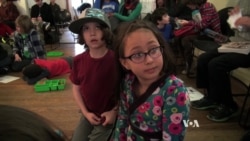It’s a typical day in the old brownstone mansion on Clinton Avenue that houses the Brooklyn Free School: seeming chaos masking an invisible order.
Students — there are about 80, ranging in age from 4 to 18 — stomp up and down five flights of stairs, thunderously. All but the youngest, who are safely corralled in a playroom, dispose themselves as they choose: reading, drawing, working on laptops, playing video games, rehearsing or building sets for the school’s upcoming annual play, an adaptation of "Hairspray."
In one classroom, a group of mostly 9-year-olds is studying West African cultures of the 19th century, with their adviser (teachers are called “advisers” at the Brooklyn Free School). In the kitchen, a few teens are baking cookies that they plan to sell to raise money for the play. A small girl has taken on the job of sweeping out an empty room by herself, while another is carrying out a box of recyclables.
No one has told the students what to do on this or any other day. Inspired by a philosophy of democratic education dating to the 1600s, there is no required curriculum, grades, homework or testing at the Brooklyn Free School. Students choose what and how they want to learn.
“There are students with very predictable, structured days, who have a weekly or daily schedule, and there are students who take a very different approach,” said the school’s director, Lily Mercogliano. “Definitely, for some students, being a part of a group of classes on a regular basis is what fits them best, and for some students, doing individual projects, individual reading, is what fits them best.”
One of the few requirements is attendance at the school’s weekly democratic governance meeting, where student votes are equal to those of the staff. Not everyone pays attention — some students read or draw through the meeting — but they must be present.
“We do have structures and rules, but the democratic system here and the philosophy behind students having choice allows for a lot of flexibility,” Mercogliano said. “Students really get to learn how to make things happen.”
Democratic schools can be found in 33 countries, including South Korea, Japan, India, Britain, Germany, Israel and Brazil, according to the Alternative Education Resource Organization. Over 100, by far the majority, are in the United States.
Skeptics question whether children can master what they need to know with no required curriculum, and advocates concede that free schools are not for everyone. But they say it’s a form of education that trusts in children’s innate desire to learn, and cultivates the independent, critical thinking that democracy depends on.
In its 11 years, the Brooklyn Free School has graduated about 24 students, Mercogliano said, the majority of whom have gone on to college. Students nominate themselves for graduation and write their own high school transcripts. Some choose to take standardized state tests and college entrance exams.
Noah Zeines, 14, said he had taken classes in Greek mythology and mathematics in the winter cycle of classes, and was about to begin physics and chemistry.
“There’s a math hour that happens every day, where students can work on their individual skills,” Mercogliano said, adding, “There’s a lot of interest in the humanities, so this year we’ve had philosophy. In the past, we’ve had things like economics. We’ve had a psychology class.”
This year, she said, students also initiated classes in geometry, African studies and analytical writing, to help with college applications.
The school is more diverse — about half the students are African-American or Latino — and less expensive than many other private schools in New York. Mercogliano says one-third pay under $500 a year in tuition, and another third about $10,000 on a sliding scale that tops out at $22,000 for those who pay full tuition.
“I’m really interested in history, and I’ve been looking a lot at comparative religions,” said Amalia Schwarzchild, 16, who has been at the school since 2013. “I’m not a tests-and-quiz person, so that was really difficult for me,” she said of her former school.
The Brooklyn Free School challenges her in a better way, she said. “I feel respected as an individual. It’s interesting, because you need to be really motivated, kind of figure out who you are as a person, but it’s also like you constantly have to be able to be like, ‘OK, I want to do this, and this is how I’m going to do it,’ ” she said.





